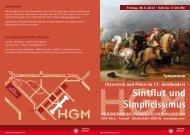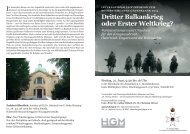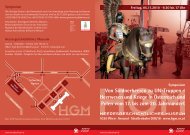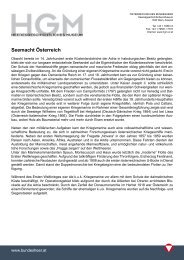Zum Saalzettel - Heeresgeschichtliches Museum Wien
Zum Saalzettel - Heeresgeschichtliches Museum Wien
Zum Saalzettel - Heeresgeschichtliches Museum Wien
Sie wollen auch ein ePaper? Erhöhen Sie die Reichweite Ihrer Titel.
YUMPU macht aus Druck-PDFs automatisch weboptimierte ePaper, die Google liebt.
Druck: BMLVS/Heeresdruckzentrum 13-0000<br />
WoMen At War – k. u. k. Bilder 1914 – 1918<br />
Temporarily photo exhibition 14.03. to 29.09.2013<br />
ÖSTERREICHISCHES BUNDESHEER<br />
<strong>Heeresgeschichtliches</strong> <strong>Museum</strong><br />
1030 <strong>Wien</strong>, Arsenal<br />
Tel: +43 1 79561-0<br />
Fax: +43 1 79561 10-17707<br />
Internet: www.hgm.or.at<br />
At the beginning of the 20th century service-based professions that required some formal training and experience<br />
had already gradually evolved. Sales-girls and secretaries streamed into jobs previously occupied<br />
solely by men. Within the family and household men still held the seat of supreme authority. They were in<br />
the position of sole provider and accordingly, the family had to follow their every command. Even though<br />
there were numerous institutions trying to provide some independence in life with education and training for<br />
daughters from the middle classes, this most frequently came to an abrupt end when the young woman was<br />
married. World War I should exert great infl uence on that social “norms”:<br />
Within summer 1914almost every European nation participating in the confl ict was infl ected by a “goinginto-war”-enthusiasm<br />
and war propaganda did most to keep up this feeling. Patriotic behaviour and actions<br />
performed by women were the most popular theme of this new art of warfare. Otherwise women and children<br />
were quintessentially seen as requiring special protection. In reality as sad as the separation of the man<br />
who went into war may have been, it was also a big step forward towards the independence of women, as<br />
they had to provide the sheer existence of their families and assumed the sole responsibility for the care of<br />
children, the family apartment, home and farm. As war continuedthe struggle for daily survival became increasingly<br />
diffi cult. The subsistence support, which the state provided families of enlisted men, was far from<br />
suffi cient to survive on. Economizing and stretching their meagre rations was the paramount task faced by<br />
the common woman during the war. At the home front numerous women’s groups and societies devoted<br />
much effort in fund raising to assist other women that were in need.<br />
War had a tremendous infl uence on society’s ever-changing sexual morality. With the continuation of the war,<br />
the longing among soldiers for their wives and girlfriends increased tremendously…war soon also began to<br />
represent the unfulfi lled desires between the sexes. The spatial separation of many couples had sexual relations<br />
outside the conjugal bonds as result. Even before the war extramarital affairs, especially of women, had<br />
moral and sometimes legal penalties, during the war these were considered almost as an “unpatriotic act”<br />
against male soldiers at the front.<br />
Within the Austro-Hungarian Military women served at the front line exclusively as volunteers. This work<br />
ranged from sneaking across the enemy lines to gather military intelligence and information concerning the<br />
strength or movement of the enemy, to delivering food and water supplies to troops at the front line, as well<br />
as all those many other untold tasks on military bases and encampments. Whether their work was in the<br />
civil service or in connection with military duties, women fulfi lled an immense service by freeing up men for<br />
active military duties. Offi cially however, none of the branches of the Austrian-Hungarian military whether it<br />
be the Army, the Austrian Landwehr, or the Hungarian Honved intended women to be combatants nor was<br />
it ever desired. The war required women to be active in caring for wounded and sick soldiers, whether this<br />
happened to be in the home country or close to the front lines.









